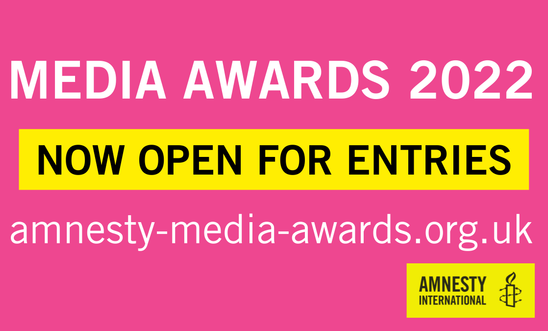
Press releases
'Amnesty Media Awards 2022' open for entries

Amnesty International UK is inviting entries for its 30th annual Media Awards, a prestigious set of awards recognising the vital role journalists play and the serious risks they face in highlighting human rights abuses around the world.
Entries can now be submitted at: https://amnesty-media-awards.org.uk/
The closing date for entries is Thursday 20 January 2022 and the award ceremony will take place at Amnesty UK’s Human Rights Action Centre in London on Wednesday 4 May 2022.
Entries must be from a media outlet based in the UK and published or broadcast for the first time in the UK between 1 January and 31 December 2021.
A list of previous winners can be found here.
CATEGORIES
Written News: A single written word news report on a current and/or breaking story relating to a human rights issue. This can be print, online or multimedia.
Broadcast News: A single film news report on a current and/or breaking story relating to a human rights issue. This can be TV or online. The entry should be no longer than 20 minutes.
Investigation: An outstanding piece of investigative journalism relating to human rights issues across all media. This can be print, broadcast, online or multimedia and may be a single report or a number of items covering the same story.
Features: A written word newspaper, magazine, online or multimedia piece that creatively explores topics, issues or stories relating to human rights.
Documentaries (TV & Film): A full-length documentary or film that observes or reports on human rights issues. The entry should be between 20 – 120 minutes duration. These must have been broadcast or available online. This can be a single film in a series or a stand-alone piece.
Radio & Podcasts: This can be either excerpts from a series, a full-length radio documentary or podcast, a news report or compilations from a magazine programme which observe and report on human rights issues. The whole entry (including compilations) should be between 15 – 60 minutes duration. These must have been broadcast or available online.
Photojournalism: A single photograph or a series of up to 12 photographs covering a human rights issue. This category is free to enter.
Student Journalist: Open to students in full-time education at a UK university, higher education or further education college at the time of publication or broadcast of their entry. Entries of up to three pieces covering human rights issues, may be in print, online or broadcast, via either a student or commercial outlet. Alternatively, they may have been produced as course work as part of media or journalism studies. Personal blog posts are not eligible for entry. This category is free to enter.
Regional Media: This category is open to any UK regional media outlet and can be print, online or broadcast. Entries may cover global or regional human rights issues. This category is free to enter.
Best Use of Digital Media: Innovative/creative presentations of human rights issues using digital tools and/or multimedia techniques to uncover or engage people in a human rights story or issue. Entrants must have been published for the first time or have had substantial fresh content published during 2021.
The Gaby Rado Award for New Journalist: Open to journalists reporting on human rights issues who have been working for five years or less in paid employment as a journalist. This award was established with the help of the family, friends and colleagues of the journalist Gaby Rado, who died in Iraq in 2003. Entries can include up to three pieces covering human rights issues and can be film, print, radio on online. This category is free to enter.
ENTRIES AND FEES:
For more information on how to enter, the entry criteria and fees, visit: https://amnesty-media-awards.org.uk/
To encourage a wide range of entries, we have established a sponsorship fund to support a limited number of entries from freelance journalists and filmmakers, as well as small digital and broadcast outlets. See the website for more details.
Entries to Regional Media, Photojournalism, Gaby Rado and Student Journalist categories are free.